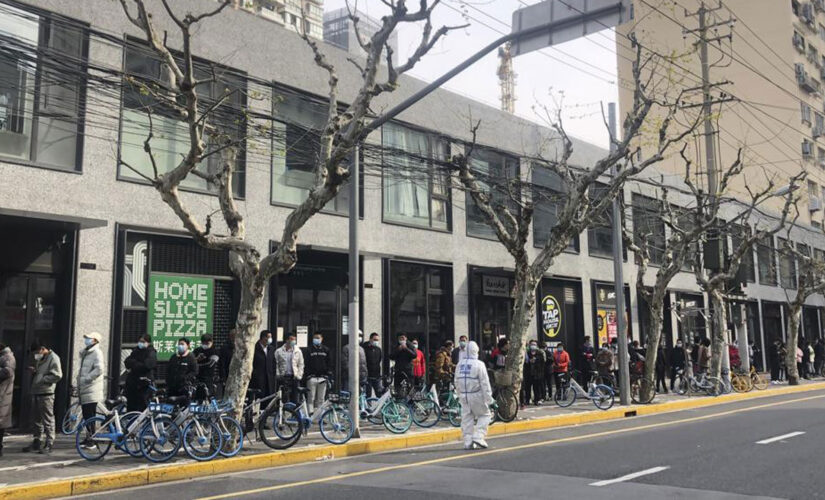NEWYou can now listen to Fox News articles!
About 16 million residents in Shanghai are being tested for the coronavirus during the second stage of the lockdown that shifted Friday to the western half of China’s biggest city and financial capital.
Meanwhile, residents of Shanghai’s eastern districts who were supposed to be released from four days of isolation have been told their lockdowns could be extended if COVID-19 cases are found in their residential compounds.
The lockdown in Shanghai, being done in two phases over eight days to enable testing of its entire population, has shaken global markets worried about the possible economic impact. China’s manufacturing activity fell to a five-month low in March, a monthly survey showed Thursday, as lockdowns and other restrictions forced factories to suspend production.
A worker in protective gear holds up a sign which reads “Do not crowd” as he directs a resident near a line for the first round of mass COVID testing in the Jingan district of western Shanghai, China, Friday, April 1, 2022. As residents of western Shanghai start a four day lockdown for mass testing, some in eastern Shanghai about to end their lock down are being told they will be confined to their homes for at least 10 more days. It was the latest wrinkle in the lockdown of China’s largest city as it struggles to eliminate an omicron-driven coronavirus outbreak under China’s zero-COVID policy. (AP Photo/Chen Si)
(AP Photo/Chen Si))
FAUCI DEFENDS CHINA: DIDN’T ‘NECESSARILY’ COVER-UP COVID
For four days starting Friday, residents of Puxi on the west side of the Huangpu River dividing Shanghai cannot leave their neighborhoods or housing compounds. The gates at some compounds were locked from the outside, with groceries and meals delivered to collection points.
Government workers and volunteers wearing full protective equipment went door-to-door with megaphones in the city with 26 million people, calling on residents to report for testing at designated sites where they were met by long lines and waits of more than 90 minutes.
China’s National Health Commission said another 1,787 domestic cases of COVID-19 had been recorded on Thursday, including 358 in Shanghai. Another 5,442 tested positive for the virus without becoming ill, 4,144 of them in Shanghai.
People who tested positive without symptoms are being taken to temporary isolation centers, including gymnasiums and exhibition centers.
A worker in protective gear holds up a sign which reads “Do not crowd” as he directs a resident near a line for the first round of mass COVID testing in the Jingan district of western Shanghai, China, Friday, April 1, 2022. As residents of western Shanghai start a four day lockdown for mass testing, some in eastern Shanghai about to end their lock down are being told they will be confined to their homes for at least 10 more days. It was the latest wrinkle in the lockdown of China’s largest city as it struggles to eliminate an omicron-driven coronavirus outbreak under China’s zero-COVID policy. (AP Photo/Chen Si)
(AP Photo/Chen Si)
SEN. RUBIO RIPS CORPORATIONS LOBBYING ON BEHALF OF CHINA: ‘HARMFUL TO US NATIONAL INTEREST
Public transport has been suspended and roads closed, bringing the normally bustling metropolis to a standstill. While city residents are being told to stay put, airports and train stations remain open.
The lockdown reflects China’s continuing adherence to its “zero-COVID” approach, despite restrictions being eased elsewhere. China set the hard-line tone at the start of the pandemic in 2020 with the 76-day lockdown on the city of Wuhan where the virus was first detected.
CLICK HERE TO GET THE FOX NEWS APP
The measures have been decried by some Chinese as excessive, although there has been little open defiance. Amid the grumbling, Shanghai authorities have conceded shortcomings in their handling of the surge driven by the omicron variant, after panic buying stripped store shelves of necessities.
“We didn’t prepare sufficiently enough,” Ma Chunlei, a senior Shanghai official said at a news conference Thursday. “We sincerely accept the criticisms from the public and are making efforts to improve it.”




